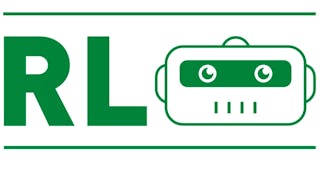Reinforcement Learning is a subfield of Machine Learning, but is also a general purpose formalism for automated decision-making and AI. This course introduces you to statistical learning techniques where an agent explicitly takes actions and interacts with the world. Understanding the importance and challenges of learning agents that make decisions is of vital importance today, with more and more companies interested in interactive agents and intelligent decision-making.



Fundamentals of Reinforcement Learning
This course is part of Reinforcement Learning Specialization


Instructors: Martha White
99,933 already enrolled
Included with 
(2,844 reviews)
Recommended experience
What you'll learn
Formalize problems as Markov Decision Processes
Understand basic exploration methods and the exploration / exploitation tradeoff
Understand value functions, as a general-purpose tool for optimal decision-making
Know how to implement dynamic programming as an efficient solution approach to an industrial control problem
Skills you'll gain
Details to know

Add to your LinkedIn profile
5 assignments
See how employees at top companies are mastering in-demand skills

Build your subject-matter expertise
- Learn new concepts from industry experts
- Gain a foundational understanding of a subject or tool
- Develop job-relevant skills with hands-on projects
- Earn a shareable career certificate

There are 5 modules in this course
Welcome to: Fundamentals of Reinforcement Learning, the first course in a four-part specialization on Reinforcement Learning brought to you by the University of Alberta, Onlea, and Coursera. In this pre-course module, you'll be introduced to your instructors, get a flavour of what the course has in store for you, and be given an in-depth roadmap to help make your journey through this specialization as smooth as possible.
What's included
4 videos2 readings1 discussion prompt
For the first week of this course, you will learn how to understand the exploration-exploitation trade-off in sequential decision-making, implement incremental algorithms for estimating action-values, and compare the strengths and weaknesses to different algorithms for exploration. For this week’s graded assessment, you will implement and test an epsilon-greedy agent.
What's included
8 videos3 readings1 assignment1 programming assignment1 discussion prompt2 plugins
When you’re presented with a problem in industry, the first and most important step is to translate that problem into a Markov Decision Process (MDP). The quality of your solution depends heavily on how well you do this translation. This week, you will learn the definition of MDPs, you will understand goal-directed behavior and how this can be obtained from maximizing scalar rewards, and you will also understand the difference between episodic and continuing tasks. For this week’s graded assessment, you will create three example tasks of your own that fit into the MDP framework.
What's included
7 videos2 readings1 assignment1 peer review1 discussion prompt
Once the problem is formulated as an MDP, finding the optimal policy is more efficient when using value functions. This week, you will learn the definition of policies and value functions, as well as Bellman equations, which is the key technology that all of our algorithms will use.
What's included
9 videos3 readings2 assignments1 discussion prompt
This week, you will learn how to compute value functions and optimal policies, assuming you have the MDP model. You will implement dynamic programming to compute value functions and optimal policies and understand the utility of dynamic programming for industrial applications and problems. Further, you will learn about Generalized Policy Iteration as a common template for constructing algorithms that maximize reward. For this week’s graded assessment, you will implement an efficient dynamic programming agent in a simulated industrial control problem.
What's included
10 videos3 readings1 assignment1 programming assignment1 discussion prompt
Earn a career certificate
Add this credential to your LinkedIn profile, resume, or CV. Share it on social media and in your performance review.
Instructors


Explore more from Machine Learning


University of Alberta


Columbia University


New York University


University of Alberta
Why people choose Coursera for their career




Learner reviews
2,844 reviews
- 5 stars
81.62%
- 4 stars
14.54%
- 3 stars
2.63%
- 2 stars
0.42%
- 1 star
0.77%
Showing 3 of 2844
Reviewed on Apr 11, 2024
The concepts may sound confusing in the beginning, but as you go forward you find it interesting and understanding. I suggest you completely read the reading assignments before watching the videos.
Reviewed on Aug 16, 2021
This course is the best course for anyone who needs to enter into the field of RL. Content within the course is excellent and instructors have explained each and every topic very well.
Reviewed on Feb 10, 2021
This is a relatively gentle introduction for the mathematically sophisticated, but does well to set the stage for the rest of the specialization and introduce the newcomer to the field.
New to Machine Learning? Start here.

Open new doors with Coursera Plus
Unlimited access to 10,000+ world-class courses, hands-on projects, and job-ready certificate programs - all included in your subscription
Advance your career with an online degree
Earn a degree from world-class universities - 100% online
Join over 3,400 global companies that choose Coursera for Business
Upskill your employees to excel in the digital economy
Frequently asked questions
Access to lectures and assignments depends on your type of enrollment. If you take a course in audit mode, you will be able to see most course materials for free. To access graded assignments and to earn a Certificate, you will need to purchase the Certificate experience, during or after your audit. If you don't see the audit option:
The course may not offer an audit option. You can try a Free Trial instead, or apply for Financial Aid.
The course may offer 'Full Course, No Certificate' instead. This option lets you see all course materials, submit required assessments, and get a final grade. This also means that you will not be able to purchase a Certificate experience.
When you enroll in the course, you get access to all of the courses in the Specialization, and you earn a certificate when you complete the work. Your electronic Certificate will be added to your Accomplishments page - from there, you can print your Certificate or add it to your LinkedIn profile. If you only want to read and view the course content, you can audit the course for free.
If you subscribed, you get a 7-day free trial during which you can cancel at no penalty. After that, we don’t give refunds, but you can cancel your subscription at any time. See our full refund policy.
More questions
Financial aid available,



